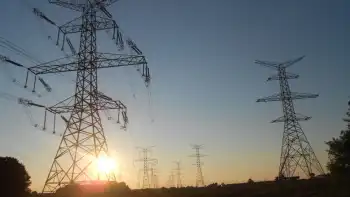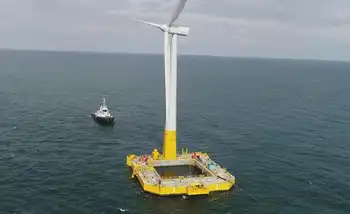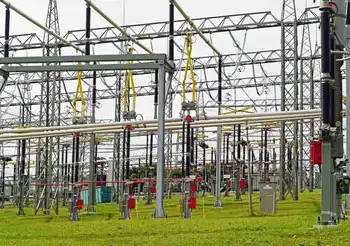Energy bill would create 5,000 new jobs in state
Wind turbine blade manufacturer Knight & Carver stands to double or triple its current 60-employee base should the measure pass.
Students are being turned away from energy-related courses offered by technical institutes in Watertown and Mitchell because they fill up so quickly. Graduates not only can remain in the state, but earn excellent salaries.
Matt McGovern of Repower South Dakota led a news conference in conjunction with a national effort to educate the public about the climate change legislation. A final nationwide Made in America jobs tour was in Pittsburgh.
Augustana College economist Reynold Nesiba cited findings from a University of Massachusetts study indicating South Dakota could gain up to 5,000 clean energy jobs.
"These are the kind of jobs that would not be easily exportable," he said.
"This is the sort of thing that would boost our economic growth. South Dakota would be one of the big winners in this legislation," Nesiba said.
Not everyone agrees.
South Dakota Farm Bureau Administrative Director Mike Held of Huron said the legislation will have devastating effects on family farms and agricultural production because of rising input costs.
Offsets may help some farmers with energy-related costs, but it will depend on where the producer is located. "Not every farmer lives in a region where wind turbines are an option. Not every farmer can take advantage of no-till. And not every farmer has the land to set aside to plant trees," said Bob Stallman, president of the American Farm Bureau.
The House version passed by a seven-vote margin, with eight Republicans supporting it. But the Senate version will likely be different.
At Dakotafest in Mitchell last month, Sen. John Thune, R-S.D., and Rep. Stephanie Herseth Sandlin, D-S.D., said in its current form the climate change legislation that passed the House would hurt farmers.
The House bill would require the United States to reduce carbon dioxide and other greenhouse gas emissions by 17 percent from 2005 levels by 2020 and by about 80 percent by mid-century.
Democrats are split on the bill. Herseth Sandlin was one of 44 Democrats to vote against the House bill. Thune says he will work to defeat it in the Senate.
Sen. Tim Johnson, D-S.D., supports a renewable electricity standard and improved residential energy efficiency in a separate energy committee measure. South Dakota can produce low-cost wind energy, he said.
Proposed cap and trade legislation is far more controversial. Steps need to be taken to reduce greenhouse emissions, but it will take decades to correct the situation, Johnson said. In the meantime, however, there will be job creation and cleaner air.
Knight & Carver Wind Group communications director John Freeman said the company has reached the point in its Howard operations where it can easily double or triple its employment base given positive market forces.
An endorsement through a renewable energy standard is needed so it can continue to hire South Dakotans and grow the business, he said.
If the bill fails to pass the Senate, it would stall the economy for the next few years.
Wessington Springs Mayor Jim Burg, a former member of the Public Utilities Commission, acknowledged people in agriculture are concerned about the rising costs of inputs such as fuel and fertilizer.
Even if rates increase, offsets would come in the form of new jobs and efficiencies, he said.
"We don't have any fossil fuels in South Dakota," Burg said. "We need to develop the products that we do have. Fear always seems to outweigh the opportunities we have."
Cap and trade would take effect whether competing nations like India and China adopt similar programs, the Farm Bureau said. Increased costs to U.S. producers would not be borne by competitive producers in other countries.
No conclusive scientific data exists that shows that the measures would have any significant impact on the climate, Held said. And reducing carbon emissions must be a shared, global responsibility, he said, or any U.S. effort will have little or no effect on the environment.
Rep. Jason Frerichs, D-Wilmot, a farmer and instructor at Lake Area Technical Institute, said the Obama administration is serious about forming a smart grid system so South Dakota can distribute wind power throughout the country.
He wants to see the Department of Agriculture as the regulatory agency involved rather than the Environmental Protection Agency.
Energy technology and energy operations programs that Lake Area Technical Institute began offering within the past two years are extremely popular. So is a similar program at Mitchell Technical Institute that focuses specifically on wind energy, Frerichs said.
McGovern said big oil and big coal interests are exaggerating the costs involved in the legislation.
The nonpartisan Congressional Budget Office has estimated the average household would see an energy cost increase of $175 a year. But that doesn't include the money-savings provisions.
Energy conservation measures could mean South Dakotans could have a net savings of $226 a year on their energy bills by 2020.
Costs are rising despite the energy legislation, said Matt McLarty, state director of the Environmental Law Policy Center. Half a dozen rate increase requests are pending before the PUC.
Related News

Switch from fossil fuels to electricity could cost $1.4 trillion, Canadian Gas Association warns
TORONTO - The Canadian Gas Association says building renewable electricity capacity to replace just half of Canada's current fossil fuel-generated energy could increase national costs by as much as $1.4 trillion over the next 30 years.
In a report, it contends that growing electricity's contribution to Canada's energy mix from its current 19 per cent to about 60 per cent will require an expansion from 141 gigawatts today to between 278 and 422 GW of renewable wind, solar and storage capacity by 2050.
It says that will increase national energy costs by between $580 billion and $1.4 trillion between 2020…




